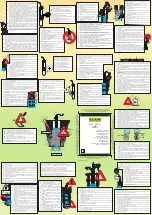
2.
Air or gases in liquid.
3.
Impeller diameter may be too small.
4.
Mechanical defects:
•
Impeller clearance too great
•
Impeller damaged
5.
Wrong direction of rotation.
6.
Be sure pressure gauge is in correct place on discharge nozzle or discharge pipe.
* When directly connected to electric motors, check whether motor wiring is correct and receives full volt-
age. When directly connected to steam turbines, make sure that turbine receives full steam pressure.
7.4 Pump works a while and then quits
1.
Leaky suction line.
2.
Stuffing box packing worn - or liquid seal plugged - allowing leakage of air into pump casing.
3.
Air pocket in suction line.
4.
Not enough suction head for hot or volatile liquids. Check carefully as this is a frequent cause of
trouble on such service.
5.
Air or gases in liquid.
6.
Suction lift too high (suction pipe may be too small or long, causing excessive friction loss).
Check with vacuum or compound gauge.
7.
Impeller plugged.
8.
Obstruction in suction or discharge line.
9.
Casing gaskets damaged.
7.5 Pump takes too much power
1.
Speed too high.
2.
Head lower than rating, pumps too much liquid.
3.
Liquid heavier than anticipated. Check viscosity and specific gravity.
* When directly connected to electric motors, check whether motor wiring is correct and receives
full voltage. When directly connected to steam turbines, make sure that turbine receives full
steam pressure.
4.
Mechanical defects:
•
Shaft bent
•
Rotating element binds
•
Stuffing box too tight
•
Impeller clearance too great
5.
Wrong direction of rotation, or impeller installed backwards.
7.6 Pump leaks excessively at stuffing box
1.
Packing is worn or not properly lubricated.
2.
Packing is incorrectly inserted or not properly run in.
3.
Packing is not correct for liquid handled.
4.
Shaft sleeve scored.
7.4 Pump works a while and then quits
48
3107 Installation, Operation and Maintenance Instructions








































